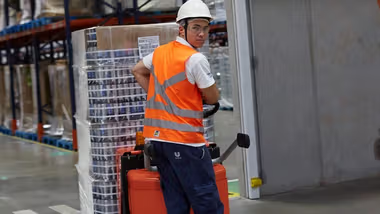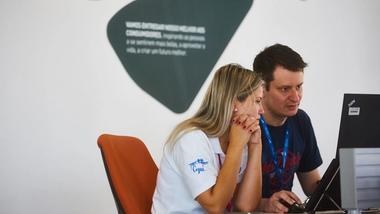


Respect for human rights doesn’t have boundaries. It has to run through every aspect of the way our business operates – and we have to demonstrate it every day, and everywhere. We’ve made it one of the goals in our Unilever Compass. (PDF 501.03 KB)
Respect and promote human rights and the effective implementation of the UN Guiding Principles.
This is one of our Respect human rights goals
This section describes some of the ways we’ve hard-wired respect for human rights into the way we do business, with more detail in our Human Rights Report 2020 (PDF 7.13 MB) . The impacts of this work are also described elsewhere across our Planet and Society Hub – for example, in Equity, diversity and inclusion , or in Raise living standards , which outlines our drive to achieve fair compensation within and beyond our business.
Our commitment to people's right to a safe and healthy workplace is described in Safety at work and Employee wellbeing . And the ways we address human rights risks when our products are sourced, manufactured and sold by people who aren’t Unilever employees are described in Human rights in our value chain . Future of work sets out our goals to equip people with skills for the future.

Our latest Report details the work we did in 2021 to continue to embed respect for human rights throughout our business.
Everything we do to advance and promote respect for human rights begins with our business culture. That means that the rights of our employees are respected – and that they understand their responsibility to promote human rights through their work.

Being a purpose-led business, behaving responsibly and respectfully towards everyone in our value chain isn’t just about our legal obligations, it’s part of who we are. It’s in our DNA.
Alan Jope, former Unilever CEOWe’re building workplace cultures that promote human rights by supporting diversity, trust and equal opportunities, and by being free from discrimination or victimisation.

Our Code of Business Principles (PDF 5.39 MB) , (our Code), defines the ethical behaviours all employees need to demonstrate when working for Unilever – and the requirements that all Unilever companies need to meet to respect the rights of employees. The Code is supported by 24 Code Policies and we expect and encourage employees to bring any breach of our Code to our attention. See Business integrity for further details.
24 Code Policies support our Code of Business Principles
Our Respect, Dignity and Fair Treatment Code Policy sets out what employees must do to uphold our culture. It also defines the requirements of all Unilever companies, such as ensuring there is no employment of individuals under the age of 15, or under the local legal minimum working age or mandatory schooling age, whichever is the higher. Processes are in place to verify these requirements. Any non-compliances are remediated.

Embedding human rights across our business means that everyone must understand how, and why, human rights matter in their day-to-day jobs.
16 We’ve translated our human rights policy into 16 languages
Our communications on human rights take the form of continuous campaigns on our internal news sites and learning platforms, as well as specific campaigns that focus on themes or events, such as our annual celebration of Human Rights Day .
Alongside regular communication, we design training that brings the issues to life – and brings home exactly what our employees need to do.
We train all our employees on respect for human rights annually.
And we continue to develop a wide range of training resources that help employees understand their own rights and the rights of others, as well as their responsibility for respecting human rights in the way they do their work.
Our five-stage training programme on business and human rights, for example, uses webinars, film and virtual live sessions to give both an overview and ‘deep-dive’ training into specific issues at regional level.

Labour rights are human rights – and freedom of association is one of our eight salient human rights issues.
Freedom of association means that workers are able to form and/or join trade unions of their choice, and to bargain collectively. Around 80% of our total workforce (blue- and white-collar) and around 89% of our manufacturing employees (blue-collar) are covered by independent trade unions or collective bargaining agreements.
Our Code of Business Principles, through its Respect, Dignity and Fair Treatment Policy, makes clear that all Unilever companies must:
Respect employees’ rights to form and join a legally recognised union of their choice or any other body representing their collective interests, and establish constructive dialogue and bargain in good faith with trade unions or representative bodies on employment conditions, labour management relations and matters of mutual concern, to the extent practicable taking national laws into consideration.
We engage in a wide range of consultation with our stakeholders on labour rights, including with the OECD, International Labour Organization, UN Global Compact, the IUF (International Union of Food, Agricultural, Hotel, Restaurant, Catering, Tobacco and Allied Workers’ Associations) and IndustriALL.
Dialogue with trade unions is very important and we continue to engage, take action and learn from best practices. We have formal and informal consultations with unions. Formal consultations are in addition to the day-to-day interactions our leadership teams have with union representatives in the factories, and regional and global consultations we have with trade union executives. Our engagement with trade unions is described in our Human Rights Report 2020 (PDF 7.3 MB) .
One of the challenges continues to be working in those countries where, due to legal frameworks, unions are neither free nor fair, there are no effective collective bargaining mechanisms and/or workers are not free to join a union of their choice. In such cases, we recognise that we need to ensure that other credible means of worker engagement are available, while always supporting independent unions and respecting the right to freedom of association.
We support the OECD Guidelines for Multinational Enterprises , which provide voluntary principles and standards for responsible business conduct in a variety of areas, including employment and industrial relations. The Guidelines take the form of recommendations addressed by governments to multinational enterprises.
OECD National Contact Points seek to resolve issues through amicable discussion to the satisfaction of all parties involved – a process the OECD describes as conciliation.
If conciliation fails, complaints are referred to the second stage in the process – mediation – in which an independent facilitator takes a more formal role in brokering an agreement.
Should this also fail, the national contact point issues a statement or makes a recommendation. Inherent in the OECD process is an investigation of the facts in order to validate the substance of the complaint.
Between 2006 and 2009, four complaints were brought to Unilever’s attention by the International Union of Food, Agricultural, Hotel, Restaurant, Catering, Tobacco and Allied Workers’ Associations (IUF), all relating to our operations in India and Pakistan. These complaints concerned site closure (Sewri factory, India), freedom of association and collective bargaining (Doom Dooma, India), and the use of temporary and contracted labour at our factories in Pakistan (Rahim Yar Khan and Khanewal). A further complaint was submitted by the Turkish transport union TUMTIS in 2008.
The unions referred their complaints to the OECD’s National Contact Points in the UK and Turkey for investigation. We agreed to co-operate fully with the OECD process to seek resolution of the cases. A series of meetings took place and resolution of each case was either agreed as part of a conciliation process or a negotiated settlement at the local level. Since these cases, we have implemented a range of actions across our business, including the development of guidelines and training, a review of our use of contract labour, and more dialogue with our stakeholders.
We’re a worldwide business with our products on sale in around 190 countries. The security situation in some regions means we have to take measures to protect our people and operations.
We apply a common level of due diligence for all our operations – which is enhanced where we identify issues of violence and conflict. We have adopted elements of the Voluntary Principles on Security and Human Rights and we’re signatories to the UN Global Compact Business for Peace Initiative .
We adhere to strict security standards for our facilities and we’ve put performance measures in place to ensure that our guarding is appropriate for the situation. Our leadership teams maintain a watching brief on potential security situations.
We maintain a formal process of audit and review to verify our security performance, and we have an externally hosted confidential Code Support line where any concerns can be raised.








We're always looking to connect with those who share an interest in a sustainable future.
Get in touch with Unilever PLC and specialist teams in our headquarters, or find contacts around the world.
This is Unilever's global company website